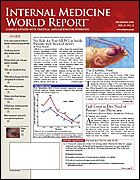Publication
Article
Internal Medicine World Report
Latest Evidence Points to Bacterial Overgrowth as a Culprit in IBS
Author(s):
From the American College of Gastroenterology
LAS VEGAS—Evidence that bacterial overgrowth in the small bowel and colon is a significant factor in irritable bowel syndrome (IBS) is leading to an examination of antibiotics as a potential treatment.
The role of bacterial flora in IBS comes from several sources. Many patients with this syndrome have bacterial overgrowth, as measured by the lactulose H2 breath test. The prevalence of breath test—confirmed bacterial overgrowth in IBS patients is as high as 80%, Mark Pimental, MD, said at the annual meeting of the American College of Gastroenterology.
In addition, postinfectious IBS is known to occur after bouts of bacterial gastroenteritis. “Food poisoning seems to trigger IBS,” Dr Pimental said.
Campylo-bacter jejuni
In animal data presented at the meeting, Dr Pimental showed that altered stool consistency and bacterial overgrowth were significantly more common in rats whose gastrointestinal (GI) tracts were infected with than in control rats.
In other studies, analysis of stool cultures in patients with IBS has demonstrated altered colonic bacterial ecology, which has led to attempts to treat IBS with probiotics to reestablish normal flora.
IBS is a complex disease that involves more than just a single etiology. Altered motility, visceral hypersensitivity, and brain—gut interactions are some of the pathways that appear to be associated with the syndrome. Subtypes of IBS are constipation-predominant and diarrhea-predominant forms.
The bacterial overgrowth theory could account for the various subtypes, said Dr Pimental, director of the GI Motility Program at Cedars-Sinai Medical Center in Los Angeles. A methane type of bacteria has been identified in the constipation-predominant form, he said, which may be responsible for slowing the gut down.
Previously, neomycin (Neo-Fradin) was shown to eliminate bacterial overgrowth and improve symptoms of IBS. In other data unveiled at the meeting, Dr Pimental and colleagues conducted a retrospective chart review of IBS patients who had at least 1 treatment for IBS based on a positive lactulose breath test.
Symptom response rates were 69% in the 84 patients who received rifaximin (Xifaxan), 38% in the 24 patients who received neomycin, and 44% in the 61 patients who received any non-rifaximin antibiotic.
Of the 20 patients who received “*”1 pre-rifaximin antibiotics and had no benefit, 75% had clinical improvement with subsequent rifaximin therapy.
Among 24 patients with recurrence who received retreatment with an antibiotic, all 16 who received rifaximin had a clinical response. In contrast, the retreatment response rate was only 25% when doxycycline (eg, Vibramycin, Periostat), amoxicillin/ clavulanate potassium (Augmentin), or neomycin was used.
Ann Intern Med
P
These data came on the heels of a double-blind, placebo-controlled study of rifaximin, 400 mg 3 times daily for 10 days, in 87 patients with IBS, also conducted by Dr Pimental and recently published (. 2006; 145:557-563). During 10 weeks of follow-up, rifaximin recipients showed a mean improvement in global symptom score of 36.4%, compared with 21.0% in patients assigned to placebo ( = .02).
A leader of the key studies that led to the approval of rifaximin for the treatment of traveler’s diarrhea, Herbert DuPont, MD, chief of internal medicine and medical director of travel medicine at St. Luke’s Episcopal Hospital in Houston, noted that rifaximin has high availability in the small bowel and preserves the colonic flora. It may also have antiinflammatory and antivirulent properties, he said.






